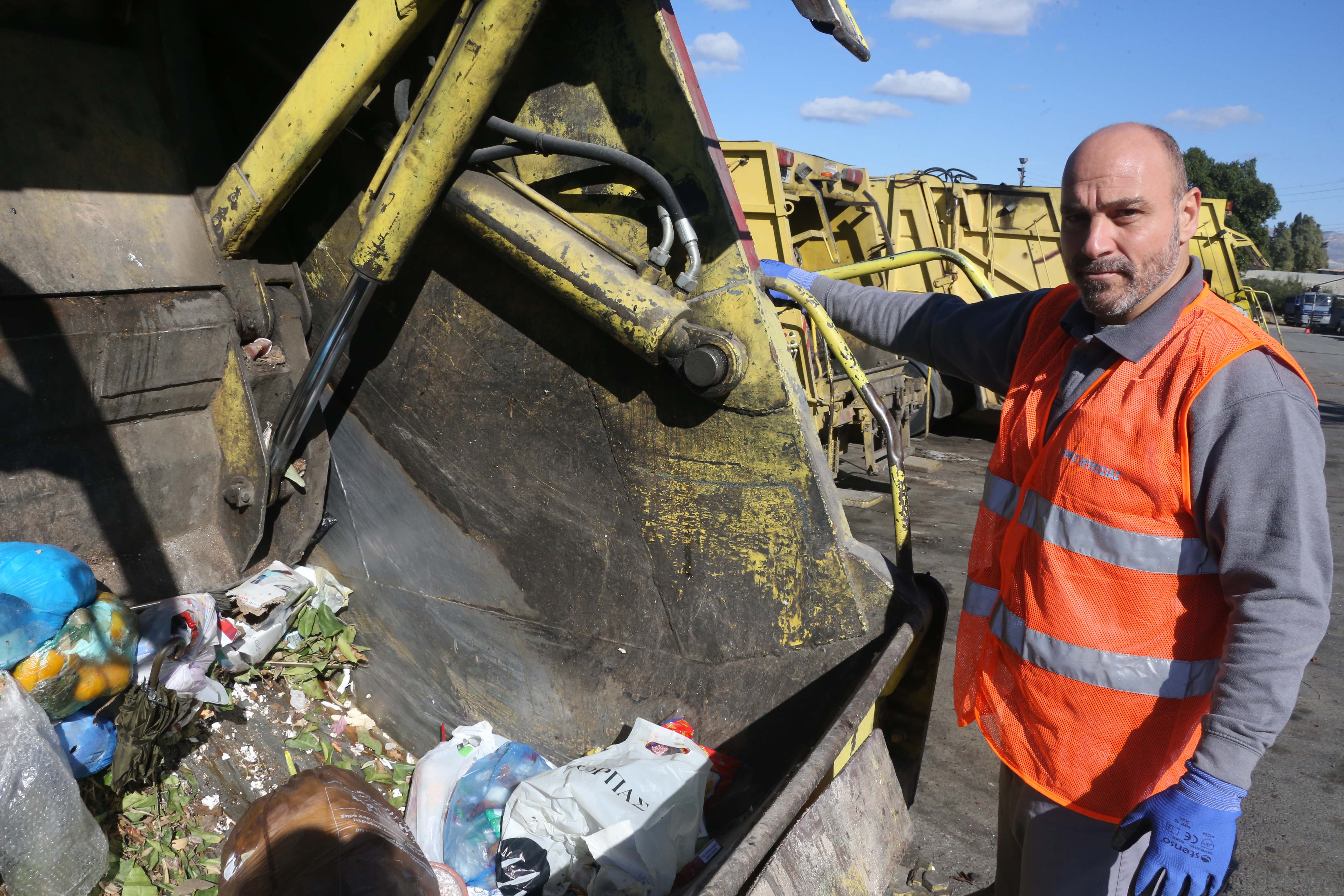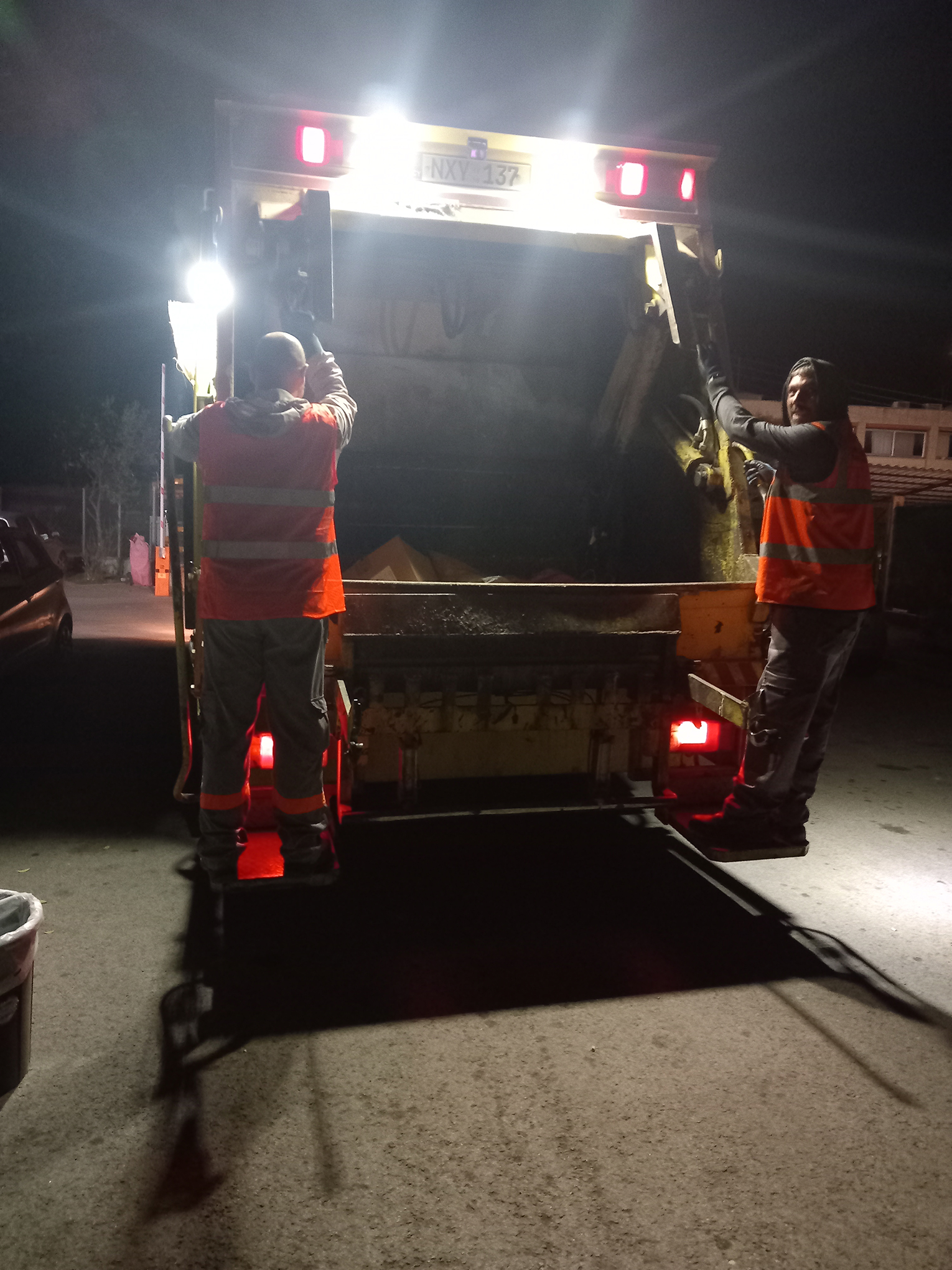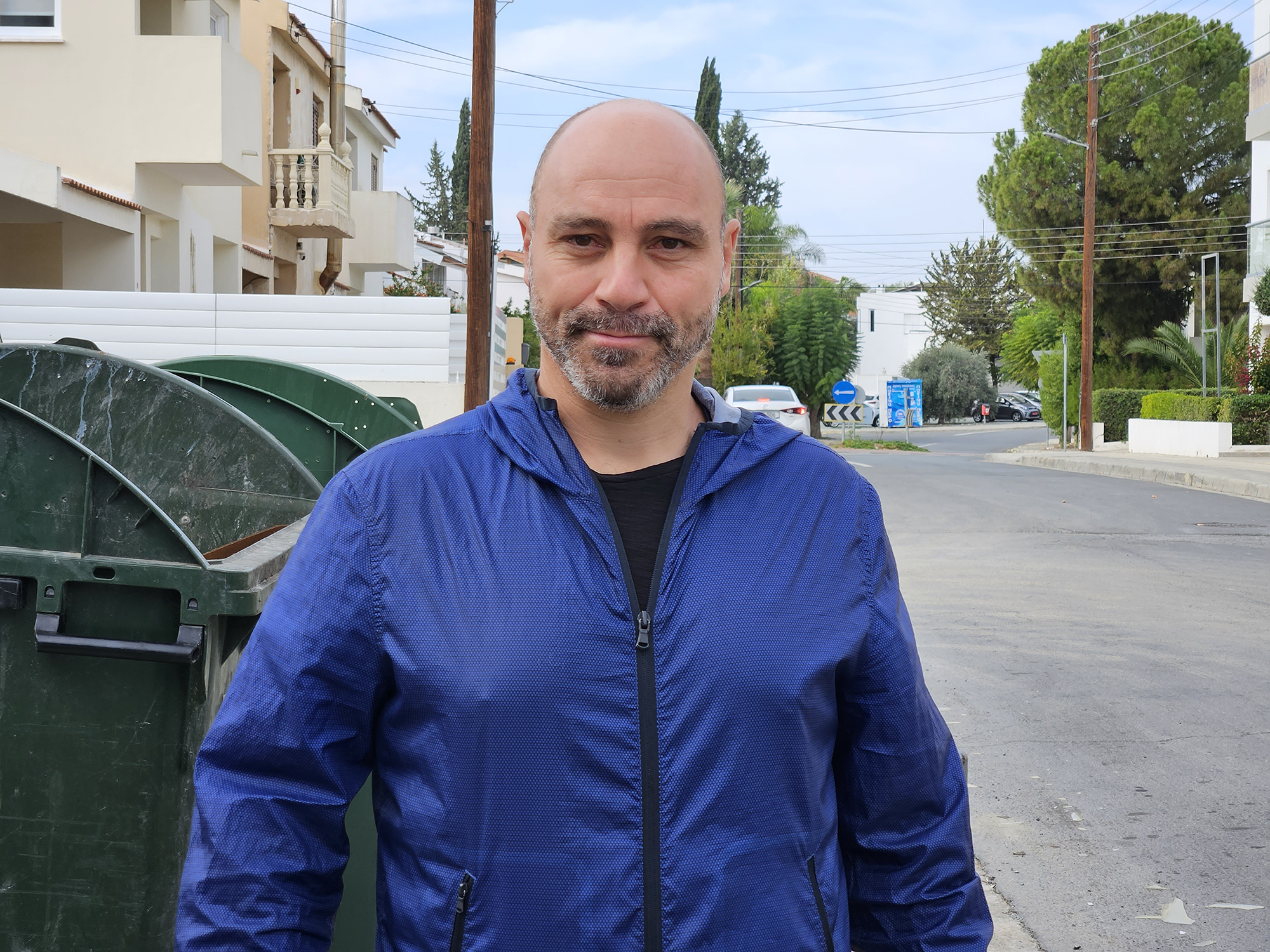Cyprus Mail 21 December 2024 - by Theo Panayides
 |
| Photo: Christos Theodorides |
The island’s overconsumption is highlighted in the tales of a rubbish collector. He has seen it all thrown away, from a tiny kitten to a gold ring
There are times, admits George Rotos, when he’ll run into someone he knows and pretend not to see them – not because he doesn’t want to talk to them but the opposite, because he doesn’t want to put them in the awkward position of having to talk to him.
It’s not personal. You might say it’s professional – though it’s personal too, insofar as it makes him feel sad. “It needs to change, the way people think,” he declares, ‘it’ being the fact that many people look down on his job – his profession – of the past 16 years. 43-year-old George is a dustman, a bin man, a garbage collector; in a word, a garbageman.
Making that admission tends to get a reaction, and he’s seen – and heard – them all. Almost everyone asks about the smell (“You get used to it,” is his weary reply) and whether it clings to his clothes (it does; you just have to wash them). Others talk down to him, assuming he must be illiterate. “We also see the faces people make when we get close with the truck,” he admits, “which… OK, they don’t like it!”.
Actually, he adds with a frown, sitting at a café near his home in Latsia on a Friday morning, “what I didn’t like, one day – it annoyed me to see it – was a mother who was maybe five or six metres away from us, walking with her kid, and she held the kid’s nose with her hand, so he wouldn’t smell it. That was bad – it felt like discrimination… It’s like OK, just walk a little faster or something. You don’t have to do that.”
That said, public reaction to George and his two-man crew (another collector at the back, plus the driver) runs the gamut from disgust to delight. “You get people who’ll stand beside the truck, ask how you’re doing, they’ll bring you water or a soft drink. Yeah, it happens! There are people who appreciate what we do… Grandmas, quite often. Little kids too, they’ll come out in the yard and greet us, or just stop and stare because – I dunno, maybe it seems like a weird job to them? No idea. But we do get a lot of kids who seem happy to see us.”
The second category (those who appreciate the garbagemen) are closer to the mark than the haters – not just because society would collapse without George and his comrades, but also because those who look down on the job are behind the times.
It was indeed quite dirty, unsociable, back-breaking work, back in the day. It still is, in some ways. Nowadays, however, the job has changed so much it’s become unrecognisable – and in fact desirable. The haters, and those fair-weather friends George avoids greeting to spare them the embarrassment, might be surprised to learn that “lots of people are queueing up to do this job”.

Admittedly, George’s own situation is especially sweet. I’d assumed that talking to any one garbageman could represent the whole profession – but, for instance, garbage collection in old Nicosia has been outsourced to a private company (“because of some programme,” he says vaguely) and that company hires migrants, a.k.a. cheap labour. Those people may indeed be exploited, forced to work 10 or 12 hours a day, just because they have no say in the matter.
George, on the other hand, works for Nicosia Municipality, on the same route he’s had since he joined 16 years ago (the centre of town, just outside the walls) – and municipal garbage collectors have a fixed schedule: five days a week, 31.5 hours in total. The starting salary is around €1,300, he estimates (his own pay is higher, after so many years of service), and the job is solid: “You get paid on time, you have a 13th salary. You get benefits, a provident fund…”
Best of all, you’re an hourly employee – not a civil servant – meaning you’re legally allowed to do other work in the abundant time available. Most of his colleagues have a second job for extra income (working as gardeners, movers, sometimes taxi drivers or in construction; some even have their own business), especially if their hours are convenient. Those with a set route also have a set shift, explains George, his own being perhaps the most enviable: he works from 7pm till around midnight, admittedly a drag on social and family life – he’s married with two daughters, aged 12 and eight – but allowing him both a free day and a decent night’s sleep.
It was different when he started out, garbage collection taking place in the wee hours with a 3am start. (The change came about for practical reasons, not because garbagemen complained per se: there just aren’t enough trucks available for everyone to go out at the same time.) The nature of the work was different too, pre-recycling and Green Points: garbage collectors had to pick up everything, paper and plastic included – not to mention that the trash came in individual bins to be lifted and carried, not today’s handy skips that simply get wheeled into place, hooked to the truck, then tipped over by mechanical arms.
After three days, he was ready to quit, recalls George with a chuckle; he’d had enough of waking up in darkness, lugging heavy bins and going home smelling fetid. His boss advised him to stick it out for a month, then see how he felt. He ended up staying, of course – partly because he had no Plan B to fall back on.

He’d grown up working-class, the youngest of three boys. His dad was a car mechanic (actually a panel beater), a business now run by George’s oldest brother; his mum was a hairdresser. “No-one in my family ever went to university,” he says, and he wasn’t the kind of lad to break the pattern: “I just didn’t like school, let’s put it that way”. He worked various jobs – as a cleaner, then food delivery, then three years as an office messenger – then ended up at the municipality, collecting refuse.
Surely this was never his dream job, though?
No, he agrees – but he didn’t really have a dream job: “I just wanted to work, buy a car, get some money…” George is affable, and a good talker; I’m not surprised to learn that he’s done this before, talking to the media (in a TV interview) about his profession. He comes off as an easy-going guy who went about life with no great expectations – and landed on his feet, with some stories to tell as a bonus.
If you do something long enough, he muses, “everything will happen [to you], and you’ll see everything”. He’s gone out five nights a week for 16 years – the first few in the early-morning hours, when the streets teem with flotsam and jetsam – and been witness to a lot, in the course of duty.
“We once saw a robbery,” he says, meaning that his crew surprised a thief in the process of breaking into a car. Another time they almost ran over a man lying unconscious in the street – but the man turned out to be intoxicated, and attacked them in a rage when finally roused. “We’ve seen a drunk woman crying for help because her boyfriend wanted to beat her up, from what she was saying.” Once, around 5am, a speeding car hit the pavement right behind them, overturned and almost careened into George, who ran for cover. It juddered to a stop and two young boys climbed out, dazed but otherwise fine.
Then there’s the work itself, the actual garbage: mostly food waste these days – Cyprus is second in the EU, throwing out 294kg of food per person annually – stinking to high heaven in the summer heat, but also the occasional surprising item which George tends to spot as the garbage gets tipped into the truck, pausing the compactor to fish it out.
“You find everything… I even found a gold ring once.” It’s a shame, said his wife when he showed her the trophy, thinking of the woman who must’ve lost it. “What do you want me to do?” replied George. “How can I know who it belongs to?”
He’s found wallets quite a few times – typically stolen and tossed in the trash, with the cash removed but ID and credit cards intact. (Those get returned to their owners, of course.) Once he found a woman’s handbag with cash still in it, just the mobile phone gone. Once he even found cash, two €50 notes together. How does someone accidentally drop cash in the garbage? “It makes no sense,” he agrees. “But it happens.”
Some items are even more surprising. Twice he’s been jabbed by needles sticking out of garbage bags and rushed to A&E, on one occasion getting a tetanus shot.

Another time, as a bag of cut twigs was going in, he noticed something moving frantically inside – and extracted a tiny kitten, seconds away from getting pulped with the trash. In the same vein, a small feline head once appeared as a skip was being tipped, the cat having fallen in, tried to escape through the hole in the bottom and got wedged, with its head sticking out. “I couldn’t bear to leave it there,” sighs George – so they stopped the truck, and slowly manoeuvred it out.
Do all garbagemen like to sift through the night’s cargo? Not necessarily. You’d expect a collector to seek promotion to driving the truck (a less onerous job) after 16 years – and George does have a professional driver’s licence, yet it suits him to stay at the business end. He’s not just a garbage collector, he’s an actual collector – and has scavenged all kinds of vintage items, from radios to old china cups and vinyl records (even paintings) through the years. Another reason why the job turned out nice for him.
His life sounds good, whatever those people he avoids in the street might say. After a shift he heads home, has a shower and is usually in bed by 2.30. (We meet at 9.30, so he doesn’t need much sleep.) He doesn’t work during the day, instead doing the school run, helping with housework, going to the gym and visiting his parents. His hobbies are sporty: previously football, currently padel. His only other passion seems to be the collection of old retro items, stacked in crates while awaiting proper sorting.
There are darker aspects to the job, but they don’t get much play in our interview. Waste is a problem in Cyprus – we’re absolutely drowning in it – but what can a garbageman do, besides witness it? “We’re over-consuming, for sure,” he offers mildly. One might also wonder how long his job can last, and how long it’ll be before municipalities start handing over to the cheaper, migrant-driven private sector – but George just shrugs. “Yeah, but we won’t accept it,” he says. “There’ll be reaction, for sure.”
In the end, the truth about being a garbageman is both more and less remarkable than the tired stereotype. It’s remarkable because – despite the yucky images (and smells) that come to mind when you think of it – it actually seems to be quite a good job, but also unremarkable because… well, because it’s a good job.
George Rotos never thought too deeply about getting into it – but has no plans to leave, and actually loves it. “After all, it’s something you do every day,” he reasons. “If you’re bored doing something you do every day, better not to do it at all.” True enough. He’ll still sometimes duck when he runs into a snobby acquaintance, though.